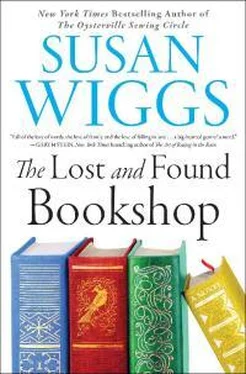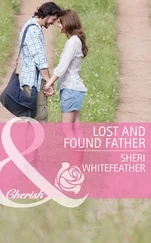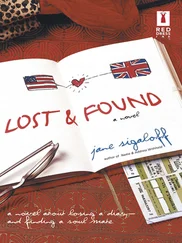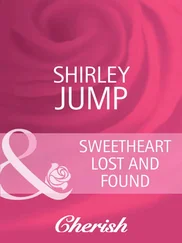—Antoine de Saint-Exupéry, The Little Prince
23
Trevor came to pick up Natalie and her grandfather for a theater performance. Bertie had a role in a Noël Coward play, and Trevor was taking them to see it and to a light supper after. It was a rainy evening, and she had just finished closing for the night.
“He’s courting you,” Grandy said, bending down to fill Sylvia’s water bowl. His tremor was bad today, and the water sloshed.
“He’s doing a good job,” Natalie admitted, grabbing a paper towel and wiping up the spill. Despite a ridiculous schedule, Trevor found time for Natalie, and she appreciated his patience. He was like his series of books—two-sided, embodying opposite concepts. A wildly popular loner. Successful and insecure. An open book of secrets.
She turned to her grandfather, studying his face. “Are you feeling all right?”
He waved a hand. “I’m feeling old. I’ll be out in the shop, chatting with your suitor.”
She sent a message to the doctor, mentioning Grandy’s tremors and his wheezing. Please don’t let me lose him now.
Jude Lockhart, the associate from Sheffield Auction House, came by the shop, shaking the rain from his shoulders. “Sorry I didn’t call first,” he said. “I have news.”
Natalie briefly introduced him to Trevor. As the two men took each other’s measure, she felt a twinge of exasperation. “What’s up?” she asked.
Jude handed her a folder of printed documents. “George Hearst owned a copy of Birds of America .”
“No kidding. Did you hear that, Grandy?” Natalie turned to Trevor. “His grandmother’s journals make mention of the Audubon books. We had this crazy notion that she might have been given a rare original edition.” She looked back at Jude. “George Hearst was the father of William Randolph Hearst?”
“Right. He was a politician, made his fortune in mining. He had one of the original hand-colored editions, four huge volumes. There were only two hundred copies produced, most of them lost and the rest in private collections or institutions.”
Jude turned to a page in the folder. “Our handwriting analyst at the firm has high confidence that the letter you found is authentic.”
“Good Lord.” Trevor studied the provenance report.
“Right? I suppose we’ll never know what became of them. Forever lost, like Colleen.” Natalie patted her grandfather’s hand. It was ice cold.
“It’s sad, losing pieces of ourselves,” he said. A bright bead of blood slipped from his nostril.
“Oh, Grandy—” Natalie gasped as her grandfather slipped to the floor as if his bones had turned to liquid. She looked up at Jude and Trevor. “Call 911.”
* * *
They kept her grandfather overnight for tests and observation. The physical symptoms, Natalie was told, were secondary to the dementia, and the tests failed to pinpoint the cause. They treated him with steroids and antibiotics, and by morning, he was ready to be discharged.
While waiting for the paperwork, Grandy dozed. Natalie sat by his bed, reading yet another guide to dealing with dementia. The books and brochures offered plenty of information and strategies, but little in the way of hope.
She studied the process of applying for guardianship. It was a likely next step, but she shied from it. Had Mom considered such a move? Sometimes when Natalie came across her mother’s wild expenditures, she would feel frustrated. The amounts Blythe had spent on alternative treatments, shamans, so-called healers whose only credential was a fancy website, often sent Natalie’s frustration spinning into anger.
She understood now. When a loved one was in distress, you would try anything.
“You miss Peach,” said Grandy suddenly, blinking awake.
“What?” The observation startled her. “Why would you say that?”
“Because I’m old, and I have no filters.”
“Oh, Grandy.” She set aside the guide. “I wish I could help. I wish I knew what to do for you.”
“I was thinking of you, not myself. You’ve kept me well and you’ve given me joy. And joy will keep you well, but you have to let it. If it’s any consolation,” Grandy said, “I miss him, too. Not the way you do, of course, but I did enjoy our conversations.”
“What do you mean, the way I do?” She felt oddly chastened and defensive.
“He lights you up.”
“I don’t know about that.” She did, though. Too often, her thoughts lingered on that evening stroll in the moon garden. That kiss. “It’s great that he was able to take care of so many repairs. But that was . . . it wasn’t a relationship. It was just work.” She had to admit, though, that she did miss him. She had become accustomed to having him around. Now that he’d moved on, she caught herself wishing she could hear his tuneful humming, his wry observations, his easy laughter.
Grandy waved a hand as if to dismiss her comment. “Stop it, Blythe. You get more than one shot. Do you understand that?”
“Grandy—”
“Dean Fogarty was not your one and only chance at love. Heartbreak is a terrible thing, but it’s not a permanent condition. If you allow it, your heart will renew itself and find joy once again.”
Rather than argue with him about her mother, Natalie smiled at him. “Is that what happened for you?” she asked. “Was May Lin your second shot?”
“She was everything I needed,” he said. “Loving her was the crowning achievement of my life. Your mother was so preoccupied with other things that she never found the one thing I wanted for her.”
Natalie studied his lined, beloved face, seeing the wisdom and compassion that had guided her in ways she was only now discovering. “Was it hard for you,” she asked, “wishing your daughter would find a love like that?”
“As a parent, wanting so much for your child isn’t the hard part,” he said. “The hard part is convincing you to believe it. You need to believe in that possibility.”
She wasn’t clear on whether he thought he was speaking to her or to her mother.
The discharge nurse and social worker came in with prescription slips and final instructions, and at last it was time to go. Her grandfather didn’t speak as they took a taxi home. Despite the chilly day, he wanted to sit in the garden while the sun was out. Natalie brought the Mackinaw blanket and tucked it around him in the chaise.
“Do you think she was lonely?” she asked him, still thinking about her mother.
His eyes misted with memories as he seemed to drift through time. “She lived for the books that filled her days. And of course, she had the most delightful of daughters. It’s quite impossible to feel lonely when you’re in the presence of a delightful child.”
“Was I?” asked Natalie. “A delightful child? I don’t think I’d ever describe myself as delightful.”
“Well, of course no child is entirely, but yes. You certainly were. You were also an anxious child,” he said. “A worrier. You worried about matters beyond your years, many matters. Money. Air pollution. Stray cats. Your grades. And you worried about the people in the books you read. We thought it was charming, but you did lose sleep over the Boxcar Children.”
She smiled. “I still don’t know how they made it through Violet’s illness in that first book.” Then she looked around the fading garden, which was in a state of semineglect, the flowers spent and gone to seed. There were a few loose boards on the shed, and a broken windowpane, and her first thought was to call Peach. She knew she wouldn’t, though.
“May Lin always kept it so beautiful out here,” she said to her grandfather. “I’m going to make time to fix things up. Does that sound good?”
Читать дальше












